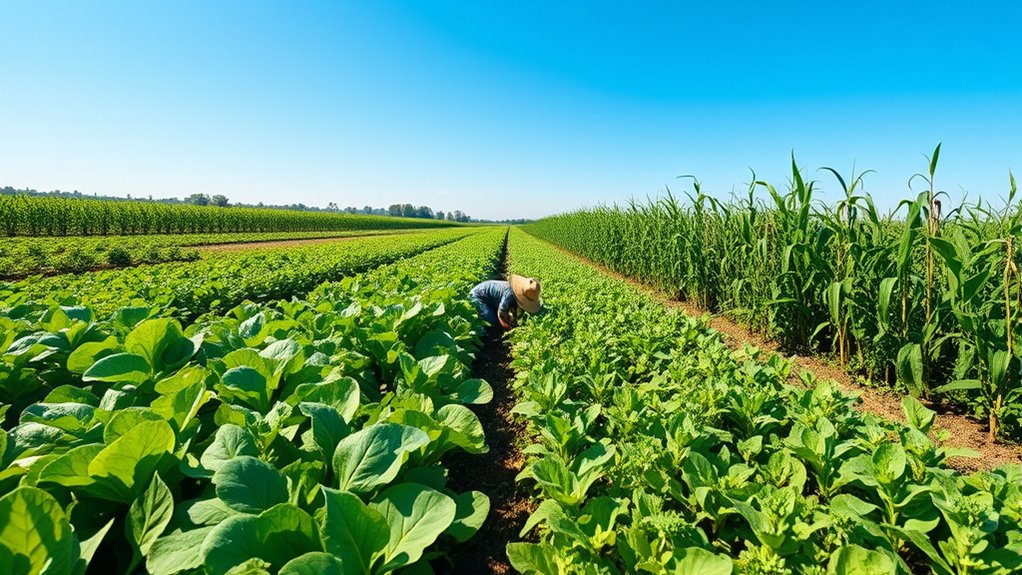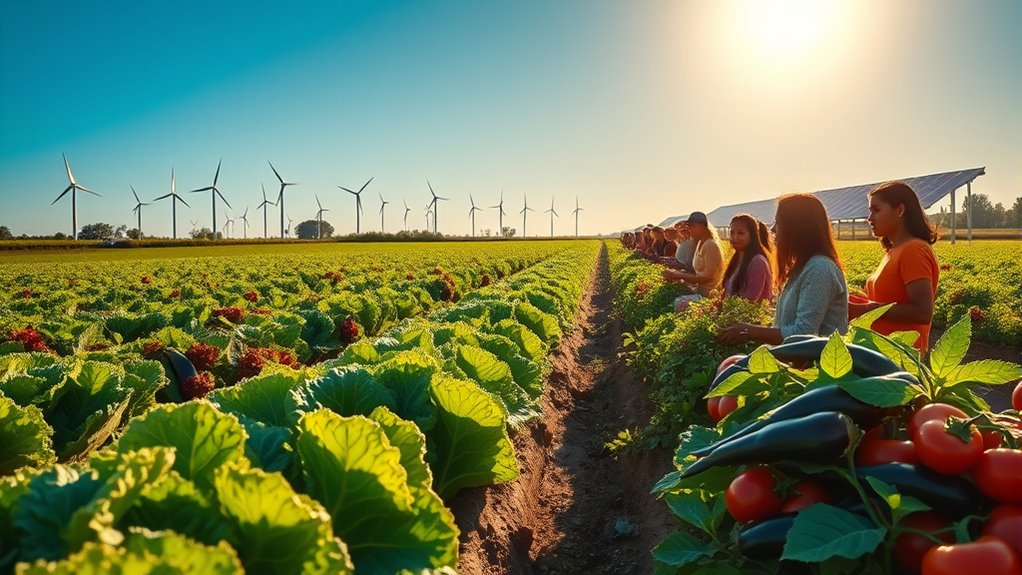By adopting a vegan lifestyle, you help reduce the demand for resource-heavy animal agriculture, freeing up land, water, and other resources for direct human use. This shift supports more sustainable food systems and enhances global food security. Innovative plant-based products, like lab-grown meats and fortified foods, expand nutritious options. While there are challenges like access and cultural habits, exploring these opportunities can pave the way for a more resilient, equitable food future—there’s much more to contemplate as you continue exploring.
Key Takeaways
- Veganism reduces resource-intensive animal agriculture, conserving water and land, and supporting sustainable food systems.
- Plant-based innovations like lab-grown meats and fortified foods expand nutritious, eco-friendly dietary options.
- Well-planned vegan diets provide essential nutrients, lower environmental impact, and promote health.
- Scaling vegan diets faces challenges including infrastructure needs, cultural acceptance, and access to new products.
- Embracing veganism can enhance global food security by optimizing resource use and diversifying nutrition.

Have you ever wondered how adopting a vegan lifestyle could impact global food security? It’s a question that touches on broader issues of sustainability, resource management, and health. As more people turn to plant-based diets, plant-based innovations are emerging at a rapid pace, offering new ways to produce food more efficiently and sustainably. These innovations include lab-grown meats, plant-based proteins, and fortified foods that mimic the nutritional profile of animal products. By shifting the focus toward these advancements, you can help reduce the demand for resource-intensive animal agriculture, which consumes large amounts of water, land, and feed. This shift not only conserves natural resources but also has the potential to free up agricultural output for direct human consumption, making food systems more efficient and resilient.
Adopting a vegan lifestyle with innovative plant-based foods can boost food security and resource efficiency.
One of the key advantages of adopting a vegan lifestyle is the increased nutritional diversity it encourages. A plant-based diet, when well-planned, can provide all essential nutrients, often with fewer calories and less saturated fat. By embracing a variety of fruits, vegetables, legumes, grains, nuts, and seeds, you can access a wide array of vitamins, minerals, and phytochemicals that support overall health. Moreover, innovation in plant-based foods is expanding your options, making it easier than ever to diversify your diet. For example, new protein sources like insect-based ingredients or algae are gaining popularity, offering nutrient-dense alternatives that can help bridge nutritional gaps in global diets. This diversity is crucial because it ensures that you and others can meet nutritional needs without relying heavily on animal products, which are often less sustainable and more resource-demanding.
However, while these innovations hold promise, challenges remain. Scaling up plant-based innovations to meet global demand requires significant investment, research, and infrastructure. There’s also the issue of accessibility; not everyone worldwide has equal access to the latest plant-based products or the knowledge needed to incorporate them into their diets effectively. Additionally, cultural preferences and traditional food practices can influence how quickly these innovations are adopted across different regions. You might find yourself needing to advocate for better education on plant-based nutrition and support policies that promote sustainable food production.
In essence, embracing a vegan lifestyle with an eye on plant-based innovations and nutritional diversity can considerably contribute to global food security. It’s about more than just personal health—it’s about shaping a sustainable future where resources are used responsibly, diets are diverse and nutritious, and everyone has access to sufficient, healthy food. The journey involves overcoming obstacles, but the potential benefits for the planet and future generations make it a compelling path to pursue.
Frequently Asked Questions
How Does Veganism Impact Local Economies Worldwide?
Veganism impacts local economies worldwide by causing economic shifts in traditional animal agriculture sectors, which may lead to job losses for farmers and workers. However, it also creates new employment opportunities in plant-based food production, retail, and innovation. You might see some communities experiencing economic challenges while others benefit from growth in plant-based industries. Overall, these changes influence local employment impacts and reshape economic landscapes in various regions.
Can Vegan Diets Sufficiently Meet All Nutritional Needs Globally?
You might find it surprising, but vegan diets can meet most nutritional needs with proper planning. Nutritional adequacy depends on diverse plant-based foods and supplements like vitamin B12. While global supplementation helps address deficiencies, some nutrients require careful attention. By choosing fortified foods and supplements, you guarantee a balanced diet. Ultimately, with awareness and proper choices, vegan diets can support health worldwide without compromising essential nutrients.
What Are the Environmental Effects of Large-Scale Vegan Food Production?
Large-scale vegan food production benefits the environment by promoting sustainable farming practices and reducing greenhouse gas emissions. It conserves water compared to animal agriculture, helping address water scarcity. However, it can still strain resources if not managed properly, leading to habitat loss or overuse of land. Overall, when done responsibly, vegan food production supports environmental health through water conservation and eco-friendly farming, but vigilance remains essential.
How Do Cultural Preferences Influence Veganism Adoption Across Regions?
Think of cultural preferences as the roots of a tree, shaping how veganism spreads across regions. Your cultural identity and dietary traditions deeply influence acceptance; in some areas, meat is a symbol of heritage, making veganism less appealing. For example, in India, vegetarianism aligns with spiritual beliefs, boosting vegan adoption. Respecting these traditions helps you understand regional differences and find ways to promote plant-based diets effectively.
Are There Technological Innovations Supporting Vegan Food Accessibility?
You’ll find that technological innovations like lab-grown meat and plant-based supplements are making vegan food more accessible. These advancements allow you to enjoy familiar textures and flavors without animal products, helping you reduce environmental impact. By embracing lab-grown meat and innovative plant-based supplements, you support sustainable diets and overcome traditional barriers to veganism, making plant-based options easier to incorporate into your daily meals.
Conclusion
Embracing veganism can be a beacon of hope in the fight for global food security, shining a light through the fog of scarcity. By choosing plant-based diets, you help ease the strain on our planet’s resources and nurture a more sustainable future. Every mindful meal you make is like planting a seed of change—growing hope and resilience in a world desperate for nourishment. Together, we can turn the tide and create a brighter, more secure tomorrow.










